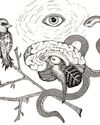
You begin your introduction to the anniversary edition by talking about the truths of existentialism being timeless. But do you think the heightened anxieties that seem so prevalent make existentialism especially relevant now?
To answer your question I need to set out briefly what the timeless truths of existentialism are. Basically, they’re the timeless truths of the human condition. Specifically, these are that we’re inalienably free in that we are constantly confronted by the requirement to choose who we are through choosing what we do. We are responsible for the choices we make. It is often recognised that existentialism is a philosophy of freedom, less so that it is a philosophy of responsibility. Our inalienable freedom makes us anxious. In The Concept of Anxiety (1844), the original existentialist Søren Kierkegaard wrote, “Anxiety is the dizziness of freedom”. It is the result of responsibility. Fear is the possibility that I might fall; anxiety is that there is nothing to stop me from jumping.
At any given moment, we are indeterminate in the sense that we are no longer what we were and not yet what we hope to become through our current actions. We always lack in the present what we hope to gain in the future. This lack is the basis of desire. We are embodied.
This story is from the {{IssueName}} edition of {{MagazineName}}.
Start your 7-day Magzter GOLD free trial to access thousands of curated premium stories, and 9,000+ magazines and newspapers.
Already a subscriber ? Sign In
This story is from the {{IssueName}} edition of {{MagazineName}}.
Start your 7-day Magzter GOLD free trial to access thousands of curated premium stories, and 9,000+ magazines and newspapers.
Already a subscriber? Sign In

Anselm (1033-1109)
Martin Jenkins recalls the being of the creator of the ontological argument.

Is Brillo Box an Illustration?
Thomas E. Wartenberg uses Warhol's work to illustrate his theory of illustration.

Why is Freedom So Important To Us?
John Shand explains why free will is basic to humanity.

The Funnel of Righteousness
Peter Worley tells us how to be right, righter, rightest.

We're as Smart as the Universe Gets
James Miles argues, among other things, that E.T. will be like Kim Kardashian, and that the real threat of advanced AI has been misunderstood.

Managing the Mind
Roger Haines contemplates how we consciously manage our minds.

lain McGilchrist's Naturalized Metaphysics
Rogério Severo looks at the brain to see the world anew.

Love & Metaphysics
Peter Graarup Westergaard explains why love is never just physical, with the aid of Donald Davidson's anomalous monism.

Mary Leaves Her Room
Nigel Hems asks, does Mary see colours differently outside her room?

From Birds To Brains
Jonathan Moens considers whether emergence can explain minds from brains.